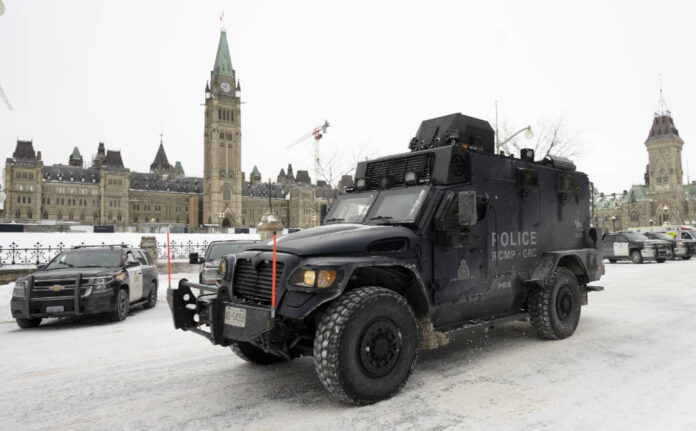OTTAWA: Canadian police on Sunday secured the downtown core of the capital with fencing as city workers cleaned up trash and snow plows cleared streets after two days of tense standoffs and 191 arrests ended a three-week occupation of Ottawa.
Demonstrators had used hundreds of trucks and vehicles to block the city center since Jan. 28, prompting Prime Minister Justin Trudeau to invoke rarely used emergency powers. Seventy-six vehicles had been towed, police said.
Stragglers on Sunday packed up a logistics depot the so-called “Freedom Convoy” had set up in a parking lot near the highway to supply the protesters camped several kilometers away in front of parliament, as police handed out flyers warning them to leave soon or risk arrest and a fine.
“We were running support for the convoy and the people in the downtown core — food, fuel, basic necessities,” said Winton Marchant, a retired firefighter from Windsor, Ontario. “This was the base camp and we are cleaning up.”
The protesters initially wanted an end to cross-border COVID-19 vaccine mandates for truck drivers, but the blockade turned into a demonstration against Trudeau and the government.
On Saturday, police used pepper spray and stun grenades on the die-hard protesters who remained, clearing most of the area in front of parliament. Other demonstrators abandoned their positions in other parts of the downtown area during the night.
Those arrested so far face 389 different criminal charges, including obstructing police, disobeying a court order, assault, mischief, possessing a weapon and assaulting a police officer, Ottawa’s Interim Police Chief Steve Bell told reporters.
“We’re not done with this operation yet,” Bell said. Over the “next several days” police will determine “how we maintain a presence and make sure that nobody returns to occupy our streets again,” Bell said.
For the first time in weeks, there was only snow and silence downtown. The trucks blaring their horns were gone. One resident said he felt relief.
“We seem to have gotten over the hump,” Ottawa resident Tim Abray told the Canadian Broadcasting Corp. (CBC). But Abray, a communications consultant, said the political division will not go away so easily.
Protesters who were filmed by police and have since left the city will be held to account, Bell said on Saturday.
“We will actively look to identify you and follow up with financial sanctions and criminal charges… This investigation will go on for months to come.”
During the past two days of protests in Ottawa and in British Columbia, where a group temporarily shut down a border crossing south of Vancouver on Saturday, several TV reporters were harassed, insulted, threatened and pushed by demonstrators.
Industry Minister Francois-Philippe Champagne said on Twitter that such treatment of journalists was “profoundly disturbing.”
One criminal investigation into the treatment of a member of the media is ongoing, Bell said, adding “the media has been subjected to slurs, to abuse.”
Trudeau on Monday invoked emergency powers to give his government wider authority to stop the protests, including sweeping powers to freeze the accounts of those suspected of supporting the blockades, without obtaining a court order.
So far 206 bank and corporate accounts have been frozen, and one financial institution blocked a “payment processor” account holding C$3.8 million ($2.98 million), police said, adding that they were still collecting information on companies and people.
Parliament continued debate over the use of the emergency powers on Sunday, with a required vote and expected passage of the powers due on Monday. The powers were fundamental in coordinating police to break up the Ottawa protest, Bell said.
Emergency Preparedness Minister Bill Blair, suggested in an interview with the CBC that the extraordinary powers may not be needed much longer.
“We’re tracking it hourly,” he said. “They will only be in place as long as they are needed to get the job done.”
Sign in
Welcome! Log into your account
Forgot your password? Get help
Password recovery
Recover your password
A password will be e-mailed to you.

